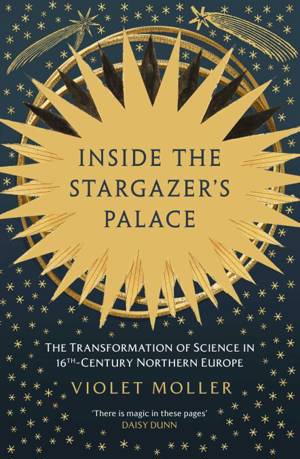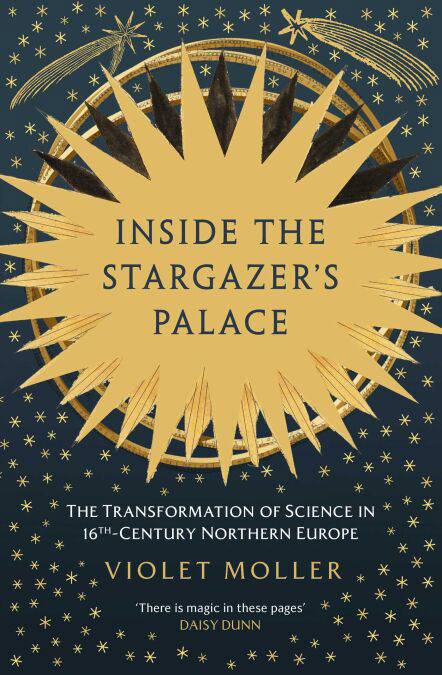
- Retrait gratuit dans votre magasin Club
- 7.000.000 titres dans notre catalogue
- Payer en toute sécurité
- Toujours un magasin près de chez vous
- Retrait gratuit dans votre magasin Club
- 7.000.0000 titres dans notre catalogue
- Payer en toute sécurité
- Toujours un magasin près de chez vous
Inside the Stargazer's Palace EBOOK
The Transformation of Science in 16th-Century Northern Europe
Violet Moller
Ebook | Anglais
17,88 €
+ 17 points
Format
Description
Enter the mysterious world of sixteenth-century science, where astronomers and alchemists shared laboratories...
'There is magic in these pages.' Daisy Dunn, author of The Missing Thread
In 1543, Nicolaus Copernicus declared the earth revolved around the Sun, overturning centuries of scholastic presumption. A new age was coming into view – one guided by observation, technology and logic.
But omens and elixirs did not disappear from the sixteenth-century laboratory. Charms and potions could still be found nestled between glistening brass instruments and leather-bound tomes. The line between the natural and supernatural remained porous, yet to be defined.
From the icy Danish observatory of Tycho Brahe, to the smoky, sulphur-stained workshop of John Dee, Violet Moller tours the intellectual heart of early European science. Exploring its rich, multidisciplinary culture, Inside the Stargazer’s Palace reveals a dazzling forgotten world, where all knowledge, no matter how arcane, could be pursued in good faith.
***
'In this fascinating study of the early scientific revolution, when experimental thought was beginning to emerge from Medieval scholasticism, Violet Moller brings to life the trailblazers of this new age.' Paul Strathern, author of The Other Renaissance
'Inside the Stargazer's Palace plunges us into an irresistible network of touchy scientists, unpredictable patrons and religious controversy in the sixteenth century, antechamber of the modern world. Violet Moller is an assured and expert guide to this world, writing with a light touch and an infectious love of her subject.' Christopher de Bellaigue, author of The Lion House
‘Inside the Stargazer’s Palace takes the reader to places they are unlikely to have visited and to figures they are unlikely to know… Violet Moller brings the world to life vividly and with style.’ Nicholas Spencer, author Magisteria
'There is magic in these pages.' Daisy Dunn, author of The Missing Thread
In 1543, Nicolaus Copernicus declared the earth revolved around the Sun, overturning centuries of scholastic presumption. A new age was coming into view – one guided by observation, technology and logic.
But omens and elixirs did not disappear from the sixteenth-century laboratory. Charms and potions could still be found nestled between glistening brass instruments and leather-bound tomes. The line between the natural and supernatural remained porous, yet to be defined.
From the icy Danish observatory of Tycho Brahe, to the smoky, sulphur-stained workshop of John Dee, Violet Moller tours the intellectual heart of early European science. Exploring its rich, multidisciplinary culture, Inside the Stargazer’s Palace reveals a dazzling forgotten world, where all knowledge, no matter how arcane, could be pursued in good faith.
***
'In this fascinating study of the early scientific revolution, when experimental thought was beginning to emerge from Medieval scholasticism, Violet Moller brings to life the trailblazers of this new age.' Paul Strathern, author of The Other Renaissance
'Inside the Stargazer's Palace plunges us into an irresistible network of touchy scientists, unpredictable patrons and religious controversy in the sixteenth century, antechamber of the modern world. Violet Moller is an assured and expert guide to this world, writing with a light touch and an infectious love of her subject.' Christopher de Bellaigue, author of The Lion House
‘Inside the Stargazer’s Palace takes the reader to places they are unlikely to have visited and to figures they are unlikely to know… Violet Moller brings the world to life vividly and with style.’ Nicholas Spencer, author Magisteria
Spécifications
Parties prenantes
- Auteur(s) :
- Editeur:
Contenu
- Nombre de pages :
- 304
- Langue:
- Anglais
Caractéristiques
- EAN:
- 9780861547531
- Date de parution :
- 12-06-24
- Format:
- Ebook
- Protection digitale:
- Adobe DRM
- Format numérique:
- ePub

Les avis
Nous publions uniquement les avis qui respectent les conditions requises. Consultez nos conditions pour les avis.






